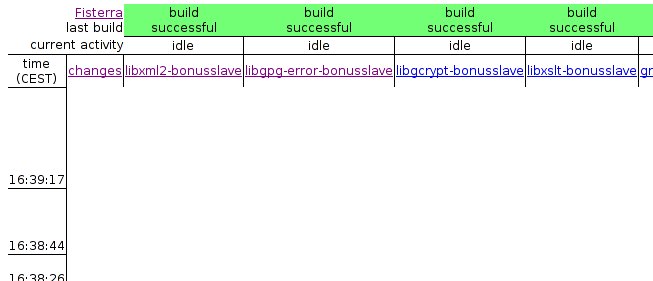Yes! Today, 21-September-2006, Igalia celebrates its 5th anniversary!

An example of party at Igalia office (year 2003 ;))
Yes! Today, 21-September-2006, Igalia celebrates its 5th anniversary!

An example of party at Igalia office (year 2003 ;))
Buildbot
Yesterday I’ve ended the documentation and upload of my JHbuild buildbot integration scripts. I’ve published a manual (jhbuild buildbot manual). With this bot, I’ve got:
This week I’ll try to get this server in production (currently I’m running it in my PC). There’s a CVS with the scripts, and you can browse them with our Bonsai.
Fisterra
These days I’ve also been preparing some patches for Fisterra framework and apps to get them easily compiled in JHBuild. I’ll try to merge the patches this week. They fix compilation with gcc 4, and make it easier to get the modules compiled in a non-standard prefix (as JHBuild requires).
5th aniversary of Igalia
Next thursday Igalia will be 5 years old. Fine to be such a long time with these guys :).
Weekend
Last saturday, I’ve gone with my girlfriend to an interesting restaurant in Vigo (Rosalia de Castro street). Tasty food (in special the hot chocolate fritters, or the veal tenderloin with strawberries and cheese sauce).
Thanks to Thomas for giving me this clue to get coverage reports with code compiled with gcc 4.x.
In order to get coverage logs, CFLAGS should include -fprofile-arcs -ftest-coverage (and preferrable to get also -O0). It’s what the gcc manual says. It was enough for gcc 3.x. But in gcc 4.x it may not. When you link, you can get this error:
hidden symbol `__gcov_init' in /usr/lib/gcc/i486-linux-gnu/4.0.3/libgcov.a(_gcov.o)is referenced by DSO
The problem seems to be caused by the linker. In theory, adding -ftest-coverage should imply linking gcov automatically. But it’s not true, at least in my case. The solution: adding -lgcov to the LDFLAGS. Finally I have coverage reports for my gcc 4.1.2 compiler.
CFLAGS=-fprofile-arcs -ftest-coverageLDFLAGS=-lgcov
First, hello to planet.gnome.org! Thanks to jdub for making it possible. Briefly, I’m working at igalia as a member of the Gnome technologies team, and currently I’m devoted to continuous integration and testing tasks under the umbrella of the Build brigade group. Hackergotchie is comming up, stay tuned.
Back from holidays. Some notes:
But now I’m back. These days I’ll try to go on with the efforts around Buildbot and jhbuild integration:
This week I’ve been playing a bit with buildbot, in order to complete my hack to get gnome jhbuild integrated with it. And it’s running now. I’ve uploaded a patch to buildbot project webpage (buildbot jhbuild support patch in sf).
The ideas of the patch are the following:
I added an example of a configuration file for buildbot master to get this working. Now I’m running gnome jhbuild in my machine. Saddenly the UI of buildbot does not scale very well for large sets of modules :(.
A capture here:

Today I’ve found a problem trying to create a patch with cvs. I haven’t got write access to gnome repository. This way I have only read-only access to it. The problem is when I try to create a patch with new files involved.
If I run:
$ cvs diff -N
it ignores the new files. If I run:
$ cvs diff -N changedfile1 changedfile2 newfile1 newfile2
it says something like this for every new file:
cvs server: I know nothing about newfile1
An easy solution would be creating two patches:
But there’s another trick to get a standard patch from cvs. You have to edit the CVS/Entries file of the directory you want to add a file. For example, for a newfile1 in directory directory1, you would change the directory1/CVS/Entries file and add an entry like this one:
/newfile1/0/Initial newfile1//
Then I can do a standard cvs diff command like this one:
$ cvs diff -N
and this will include the new files in the patch. Of course you can use the -u/-U parameters to get unified format patches.
Since the last post, I’ve began to implement all the required methods to provide a complete DBus functionality in jhbuild. I added the following DBus interfaces:
You can hook to the following signals:
The biggest problem I’ve faced these days was related to the way I could launch the subprocess for build/update commands. As it’s called in a dbus handler, I couldn’t put the jhbuild script in another thread. And the method should return immediately without waiting for the end of the command. I had to use the gobject.Idle interface to hook the build to the gobject mainloop, this way:
The code for the idle child is something like this:
class JHBuildBuilderIdle(gobject.Idle): def __init__(self, builder): gobject.Idle.__init__(self) self.set_callback(self.callback, builder) def callback(self, builder): builder.build() return False
And the call in the dbus handler is this:
@dbus.service.method('org.gnome.JHBuildIFace')
def build(self, modulelist = [], skiplist = [], start = None, datespec = None, options = {}):
[...]
build = jhbuild.frontends.get_buildscript(ownconfig, module_list)
idle = JHBuildBuilderIdle(build)
idle.attach()
return
Tomorrow I’ll add this work to the jhbuild bugzilla in order to begin the discussion upstream.
Today I’ve began the experiment to add DBus support to JHBuild. To do this I’ve established these goals:
And guys, I did it! I’ve added a new dbus command to jhbuild to launch it as a DBus service, and begin to wait for user calls.And added a dbus frontend to buildscript. This frontend offers signals to know the status of a compilation (offering methods to get the logs, and to know the current status of compilation.
If I run:
dape@bonus:~$ dbus-send --print-reply --dest='org.gnome.JHBuild'/org/gnome/JHBuildObject org.gnome.JHBuildIFace.build
it launches a complete build. For example, I can use dbus-monitor to view events, and I get a log like this one:
signal sender=:1.95 -> dest=(null destination) interface=org.gnome.JHBuildIFace; member=end_phase_signalstring "libxml2" string "checkout" string "false"signal sender=:1.95 -> dest=(null destination) interface=org.gnome.JHBuildIFace; member=start_phase_signalstring "libxml2" string "build"signal sender=:1.95 -> dest=(null destination) interface=org.gnome.JHBuildIFace; member=message_signalstring "Building libxml2"signal sender=:1.95 -> dest=(null destination) interface=org.gnome.JHBuildIFace; member=message_signalstring "make all-recursive make[1]:se ingresa al directorio `/usr/local/devel/dape/cvs/libxml2'Making all in include
This way we can communicate with the JHBuild compilation loop. It should be interesting to avoid running jhbuild (and loading python) for each compilation in an integration loop. But it also adds an asynchronous channel to communicate with continuous integration tools. I’ll go on completing the dbus interface for most used commands of jhbuild tomorrow, and also add customizability (currently it does not wait for many kinds of parameters, it should be improved). When it’s more polished I’ll propose the patch for jhbuild.
These days I’ve been doing some work in JHBuild to make life easier for those who want to run it from a Continuous Integration loop. In particular, it should improve the experience for those using Buildbot (as we intend in the Gnome Build Brigade).
Checkout modes for JHBuild
In Buildbot, most used build scripts enable you to decide how checkouts are done. The options are currently four:
For me, the most interesting options are the copy mode and the clobber mode. In continuous integration loops, we usually don’t add modifications over the compilation trees, but merge conflicts raise frequently. With those options, you get an easy solution.
I’ve added a bug and a patch to JHBuild bugzilla to support checkout options. With this patch, you can establish a global checkout mode, and specific checkout modes for each module in jhbuildrc file.
Running make check from jhbuild without breaking all the moduleset build every time
Currently JHBuild lets you run make check for modules using the autotools module type. If you set the makecheck variable in jhbuildrc, it will run make check before installing the packages. The problem with this is: if the checks fail, then JHBuild considers the module is broken, and then it will not compile the modules depending on it.
I’ve written a patch to change this behavior. With this, you can set up a unittestfails variable (currently defaulting to True to maintain current behavior) in jhbuildrc. If this variable is false, make check failures don’t break compilations of the module. It goes on compiling, but shows a message in the log warning about this.
There was an old bug talking about this in JHBuild bugzilla. I added the patch to this bug.
Future work
Two ideas for JHBuild integration with other tools:
I’ll be working on this next week.
As I wrote last week, I’ve been attending to Guadec 2006 in Vilanova i la Geltru. A very positive experience, with lots of meetings, talks and interesting events in general.
For last thursday, there was a BOF about Continuous Integration hosted by Juan José Sánchez. There, I presented the work with Tinderbox here in Igalia, and we discussed a bit about the requirements for a Continuos Integration service in Gnome project. The interest was more than I expected, and we shared our experiences and decided to create a work group to get the infrastructure up. It’s called Gnome Build Brigade, and we’ve set up a wiki (yes, all belongs to wiki!)
Currently we have the fantastic work from Frederic Peters (JHAutobuild). It’s running last months, and offers RSS information about compilation status for developers.
But Thomas Vander Stichele proposed Buildbot, as they’re using it in Fluendo for gstreamer. Main reasons: well maintained, big community and more mature. So it seems the way to go, and I began to test it yesterday, as I’m planning to move Fisterra continuous integration to Buildbot.
Yes, buildbot is very easy. It’s more strict about clients (slaves in its notation), but it lets server administrator get a better control over them. And the model is more secure. I’ve also been learning a bit about Twisted, the framework it uses to implement an asynchronous events system. I also implemented a prototype of integration with jhbuild that is working for small sets of modules, but does not handle dependencies yet.
My compromise with Build brigade group is about jhbuild work anyway. I’ll be these days working on JHBuild integration, to extend it to fit better with CI systems (I’ve prepared a patch for stages splitting, and I would want to add more options to checkout). I’ll write about these next days.